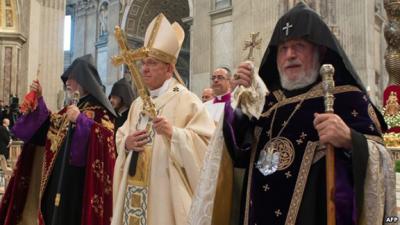Pope to visit Armenia, Georgia and Azerbaijan

VATICAN CITY – Pope Francis will make a pastoral visit to Armenia June 24-26 and then return to the Caucasus region Sept.30-Oct.23 for a trip to Georgia and Azerbaijan, the Vatican said Saturday.
The pontiff’s sojourn in Armenia at the invitation of Armenian Supreme Patriarch Karekin II as well as civil authorities and the local Roman Catholic Church, could strain diplomatic relations between Turkey and the Holy See, Vatican watchers say.
In April 2015, Francis strongly condemned what he defined the “Armenian genocide.” In particular, he blasted the death marches, carried out by the Ottoman Turks in 1915. Armenian historians' say that some 1.5 million Armenians were deported from their homes and that most of them died from hunger, disease and forced labor.
His statements evidently were not appreciated by Ankara, which disputes the figure and claimss the deaths were part of a civil conflict triggered by the First World War. Turkish foreign minister Melvut Cavusoglu upbraided the Apostolic Nuncio, Antonio Lucibello, accusing the pope of “xenophobia and intolerance.” In particular, according to Cavusoglu, the term “genocide” refers to a legal concept -- for this reason, its use by Francis would have been misleading, since no international court has ever expressed verdicts in this sense.
However, it was not the first time the Holy See levelled an accusation of genocide against Turkey. The last pope to visit Armenia was Pope John Paul II in 2001. At the time, the pontiff and the Armenian Church leader, Karenkin II, defined the War World I events “a Great Evil.” Also because of this reason, the then cardinal Joseph Ratzinger expressed doubts concerning admission of Turkey in the European Union: a strong position that, as Pope, he weakened in 2006, in order to achieve a better relationship with Turkish President Erdogan’s government.
However Andrea Tornielli, a respected journalist at the Italian online newspaper Vatican Insider, said in an interview that: “The Pope does not travel for geopolitical reasons: his road map is the Gospel. That allows him a considerable freedom and the opportunity to be open to everyone. Through his trip in Armenia, in the aftermath of the Armenian genocide anniversary, the Pope honors a population that suffered a lot. At the same time, he wants that memory and historical truth generate friendship, not conflict.”
Concerning Erdogan’s potential reaction, Tornielli was cautiously optimist: “Francis has already been in Turkey. He was received by Erdogan in his new huge presidential palace. Turkish people know well the great friendship between Bergoglio and the Armenian community of Buenos Aires. The papal visit does not represent a problem. Nevertheless, if the Pope speaks concerning Armenian Genocide, it will probably produce a controversy.”
For this reason, Francis’ upcoming trip to Armenia could produce some important consequences not merely on the geopolitical side but also on the religious and pastoral one: firstly in terms of ecumenism.
Reputedly the first nation to adopt Christianity as state religion (in 301 AD), Armenia presents a vast Christian majority. In particular, about 90 percent of Armenian Christians belong to the Armenian Apostolic Church, which is in communion only with some Orthodox churches. It differs from Roman Catholic doctrine in some fundamental theological issues. In particular, Armenians profess Myaphysitism, according to which in Jesus Christ divinity and humanity are united in one nature, without any separation. On the contrary, Roman Catholicism believes that Christ is characterized by human and divine natures. Nonetheless, both the Churches agree on many other matters.
In this sense, the papal trip could reinforce pastoral and religious relationship with the Armenian Apostolic Church: a fundamental part of Francis complex strategy, aimed to create an alliance with parts of the Orthodox world, in the name of a strong fight against secularism, poverty and terrorism. “Today, the relationship between the Roman Church and the Armenian Church is good” said Tornielli “In theological terms, several aspects have been clarified: the Armenian Church is the 'closest' to the Roman Church. Certainly the papal visit will strengthen this relationship”.


